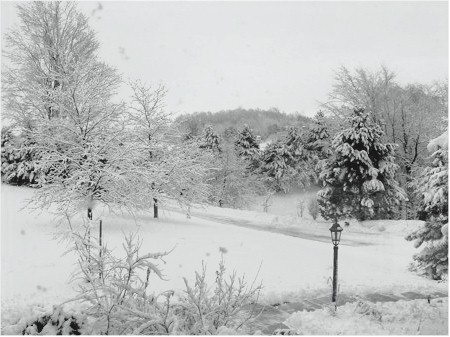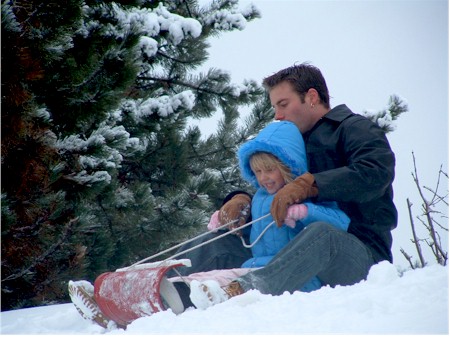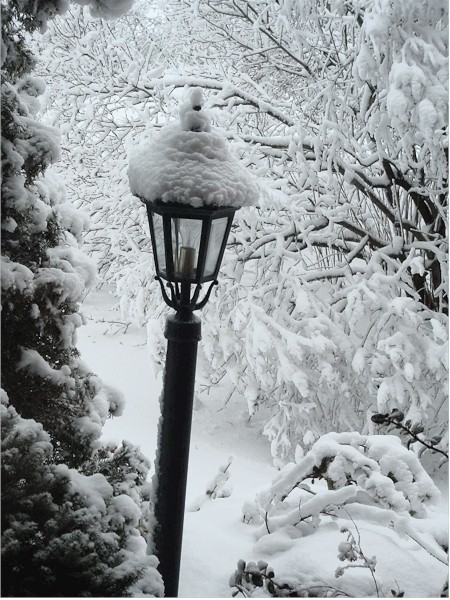 We woke up this morning, Boxing Day, to the scene above, as far as the eye could see. As soon as I got up I had to get outside, get everyone else outside, take pictures. I just stood out there with my mouth open. As soon as I’d shoveled the walk (the kids & grandkids stayed overnight and had to leave at noon today) I went back inside, got the camera, and just wandered around, staring. I felt as if I was seeing the world as an artist. It was pure sensation. There was no intellectualization — “that’s a lamppost”, “that’s how I should frame this shot”. I was seeing only with the right side of my brain — seeing dark and light, spaces and shadows, not processing what I was seeing and iconizing it. I watched a downy woodpecker fly across the yard and land on the pole of our snow-covered bird feeder, and then do a double-take — “this is not a tree”. A pair of wild rabbits scrambled through the snow, running in circles around the trees. What pulled me outside was pure emotion, pure sensation, and it was that emotion, that feeling, not some ‘object’ I wanted to ‘capture’ with the camera. All my senses were alert, blurred into synaesthesia (in the scientific sense of integrated, rather than the psychological sense of jumbled). I was sensing profoundly, viscerally, like an animal. And it occurred to me that, just as our mental processing of objects begins to interfere with our artistic ability to represent them authentically, our mental processing abstracts our entire reality. Our ability to perceive authentically is diminished as our ability and inclination to conceive increases. The more we think, the less purely we sense, and the less we really feel. This is an arguable and completely unsupported hypothesis, of course, but it ‘makes sense’ to me. The correlation between intensity of sensation and intensity of emotion (we even use the ambiguous word ‘feeling’ to describe both) seems to me instinctively obvious. Animals with minimally-conceiving brains live their entire lives synaesthetically (perhaps with the exception of rare moments when they are ‘rationally’ fearful — when they ‘conceive’ that their, or their loved-ones’, lives are in danger). It must be a wonderful, constantly astonishing, richly emotional life. No wonder that, despite their ‘inability’ (or lack of need) to conceive of the idea of their own mortality or purpose in life, they seek so passionately to live! We humans were definitely short-changed when in comes to acuity of senses. We have only a few evident senses to begin with, and they’re pretty dim compared to those of other creatures — many birds and animals see better than us, and differently from us, and most hear and smell better than we do, and sometimes seem to have senses we lack entirely. If our lives are sensually poorer than other creatures’, it seems sensible to me that our lives are also emotionally emptier, shallower. We were endowed by nature instead with a bigger and more complex brain than most other creatures, a compensatory advantage. But I wonder if as our ability for abstraction increases it also further diminishes our ability to feel, distances us from our senses and emotions by putting a conceptual veil between the real world and the representational theatre of it that plays continually in our heads. The first one to follow me outside this morning was our grand-daughter Cassandra. She’s a natural athlete and I watched to see how much of her attention would be captured by the amazing panorama that greeted her eyes as she stepped outside. Although it’s unfair to judge, and I have no doubt that children are more synaesthetic than adults, it seemed to me that she was immediately taken by the athletic promise of the snow — she had the ‘flying saucer’ type toboggan in her hand as she came out. I watched her as she slid down the front hill of our lot, and she seemed much more excited by the speed than by the natural wonder all around her. She went to retrieve her dad when she became impatient with my shoveling. I sent them around to the more obstacle-free back hill with the faster aluminum toboggans, and followed soon after with the camera in hand. I took some photos that were memorable in a different sense:
A half hour later the tobogganing was followed by a snowball fight, and then I returned to my nature photography. I just missed the rabbits in this shot but I still like it:
I thought it was curious that this experience followed less than a week after my story about the skunk, and my article about closing your eyes and imagining. I sometimes think anything can happen, and will only happen, when you’re ready for it. (more pictures on my Flickr page) |
Navigation
Collapsniks
Albert Bates (US)
Andrew Nikiforuk (CA)
Brutus (US)
Carolyn Baker (US)*
Catherine Ingram (US)
Chris Hedges (US)
Dahr Jamail (US)
Dean Spillane-Walker (US)*
Derrick Jensen (US)
Dougald & Paul (IE/SE)*
Erik Michaels (US)
Gail Tverberg (US)
Guy McPherson (US)
Honest Sorcerer
Janaia & Robin (US)*
Jem Bendell (UK)
Mari Werner
Michael Dowd (US)*
Nate Hagens (US)
Paul Heft (US)*
Post Carbon Inst. (US)
Resilience (US)
Richard Heinberg (US)
Robert Jensen (US)
Roy Scranton (US)
Sam Mitchell (US)
Tim Morgan (UK)
Tim Watkins (UK)
Umair Haque (UK)
William Rees (CA)
XrayMike (AU)
Radical Non-Duality
Tony Parsons
Jim Newman
Tim Cliss
Andreas Müller
Kenneth Madden
Emerson Lim
Nancy Neithercut
Rosemarijn Roes
Frank McCaughey
Clare Cherikoff
Ere Parek, Izzy Cloke, Zabi AmaniEssential Reading
Archive by Category
My Bio, Contact Info, Signature Posts
About the Author (2023)
My Circles
E-mail me
--- My Best 200 Posts, 2003-22 by category, from newest to oldest ---
Collapse Watch:
Hope — On the Balance of Probabilities
The Caste War for the Dregs
Recuperation, Accommodation, Resilience
How Do We Teach the Critical Skills
Collapse Not Apocalypse
Effective Activism
'Making Sense of the World' Reading List
Notes From the Rising Dark
What is Exponential Decay
Collapse: Slowly Then Suddenly
Slouching Towards Bethlehem
Making Sense of Who We Are
What Would Net-Zero Emissions Look Like?
Post Collapse with Michael Dowd (video)
Why Economic Collapse Will Precede Climate Collapse
Being Adaptable: A Reminder List
A Culture of Fear
What Will It Take?
A Future Without Us
Dean Walker Interview (video)
The Mushroom at the End of the World
What Would It Take To Live Sustainably?
The New Political Map (Poster)
Beyond Belief
Complexity and Collapse
Requiem for a Species
Civilization Disease
What a Desolated Earth Looks Like
If We Had a Better Story...
Giving Up on Environmentalism
The Hard Part is Finding People Who Care
Going Vegan
The Dark & Gathering Sameness of the World
The End of Philosophy
A Short History of Progress
The Boiling Frog
Our Culture / Ourselves:
A CoVid-19 Recap
What It Means to be Human
A Culture Built on Wrong Models
Understanding Conservatives
Our Unique Capacity for Hatred
Not Meant to Govern Each Other
The Humanist Trap
Credulous
Amazing What People Get Used To
My Reluctant Misanthropy
The Dawn of Everything
Species Shame
Why Misinformation Doesn't Work
The Lab-Leak Hypothesis
The Right to Die
CoVid-19: Go for Zero
Pollard's Laws
On Caste
The Process of Self-Organization
The Tragic Spread of Misinformation
A Better Way to Work
The Needs of the Moment
Ask Yourself This
What to Believe Now?
Rogue Primate
Conversation & Silence
The Language of Our Eyes
True Story
May I Ask a Question?
Cultural Acedia: When We Can No Longer Care
Useless Advice
Several Short Sentences About Learning
Why I Don't Want to Hear Your Story
A Harvest of Myths
The Qualities of a Great Story
The Trouble With Stories
A Model of Identity & Community
Not Ready to Do What's Needed
A Culture of Dependence
So What's Next
Ten Things to Do When You're Feeling Hopeless
No Use to the World Broken
Living in Another World
Does Language Restrict What We Can Think?
The Value of Conversation Manifesto Nobody Knows Anything
If I Only Had 37 Days
The Only Life We Know
A Long Way Down
No Noble Savages
Figments of Reality
Too Far Ahead
Learning From Nature
The Rogue Animal
How the World Really Works:
Making Sense of Scents
An Age of Wonder
The Truth About Ukraine
Navigating Complexity
The Supply Chain Problem
The Promise of Dialogue
Too Dumb to Take Care of Ourselves
Extinction Capitalism
Homeless
Republicans Slide Into Fascism
All the Things I Was Wrong About
Several Short Sentences About Sharks
How Change Happens
What's the Best Possible Outcome?
The Perpetual Growth Machine
We Make Zero
How Long We've Been Around (graphic)
If You Wanted to Sabotage the Elections
Collective Intelligence & Complexity
Ten Things I Wish I'd Learned Earlier
The Problem With Systems
Against Hope (Video)
The Admission of Necessary Ignorance
Several Short Sentences About Jellyfish
Loren Eiseley, in Verse
A Synopsis of 'Finding the Sweet Spot'
Learning from Indigenous Cultures
The Gift Economy
The Job of the Media
The Wal-Mart Dilemma
The Illusion of the Separate Self, and Free Will:
No Free Will, No Freedom
The Other Side of 'No Me'
This Body Takes Me For a Walk
The Only One Who Really Knew Me
No Free Will — Fightin' Words
The Paradox of the Self
A Radical Non-Duality FAQ
What We Think We Know
Bark Bark Bark Bark Bark Bark Bark
Healing From Ourselves
The Entanglement Hypothesis
Nothing Needs to Happen
Nothing to Say About This
What I Wanted to Believe
A Continuous Reassemblage of Meaning
No Choice But to Misbehave
What's Apparently Happening
A Different Kind of Animal
Happy Now?
This Creature
Did Early Humans Have Selves?
Nothing On Offer Here
Even Simpler and More Hopeless Than That
Glimpses
How Our Bodies Sense the World
Fragments
What Happens in Vagus
We Have No Choice
Never Comfortable in the Skin of Self
Letting Go of the Story of Me
All There Is, Is This
A Theory of No Mind
Creative Works:
Mindful Wanderings (Reflections) (Archive)
A Prayer to No One
Frogs' Hollow (Short Story)
We Do What We Do (Poem)
Negative Assertions (Poem)
Reminder (Short Story)
A Canadian Sorry (Satire)
Under No Illusions (Short Story)
The Ever-Stranger (Poem)
The Fortune Teller (Short Story)
Non-Duality Dude (Play)
Your Self: An Owner's Manual (Satire)
All the Things I Thought I Knew (Short Story)
On the Shoulders of Giants (Short Story)
Improv (Poem)
Calling the Cage Freedom (Short Story)
Rune (Poem)
Only This (Poem)
The Other Extinction (Short Story)
Invisible (Poem)
Disruption (Short Story)
A Thought-Less Experiment (Poem)
Speaking Grosbeak (Short Story)
The Only Way There (Short Story)
The Wild Man (Short Story)
Flywheel (Short Story)
The Opposite of Presence (Satire)
How to Make Love Last (Poem)
The Horses' Bodies (Poem)
Enough (Lament)
Distracted (Short Story)
Worse, Still (Poem)
Conjurer (Satire)
A Conversation (Short Story)
Farewell to Albion (Poem)
My Other Sites







I may seem like a so-callled Cranky Guy Dave. Ahem, take a day off. Just a suggestion….Does that sounds fun?
Hi Dave… what a beautifull sight…. i have never lived a snowy Christmas… (mine are always sunny, summer fun)……….–You said “This is an arguable and completely unsupported hypothesis, of course, but it ‘makes sense’ to me….” Some time ago, I had a similar experience while doing tai chi in a cliff with the open ocean in front… suddenly a strong sea breeze burst into myself and …….. –Talking about this feeling with my bio energetic doctor, she explained to me that this strong connections are possible when “all our Chakras are fully open at the same time and whirl possitively in concordance with the universe….” Of course…. “this is an arguable and completely unsupported hypothesis, but it ‘makes sense’ to me”…Ha ha. —– Have you read Antonio Damasio (neuroscientist); “Descartes error” and “The feeling of what happens” (not so sure of the english name)… an easy to read description of the process from the begining : from the perception of “X” up to the achieving of consciousness— Mariella.
Lovely, Dave! It’s been raining and slushing here mostly these last few days, so I feel blessed by your view!Feith
your hypothesis is pretty well-supported (though not “scientifically”, which i think is what you meant) by all the texts on mindfulness I’ve ever read. What you’ve described is simply called “being in the present moment.”
Beautiful photos!
Thanks, everyone.